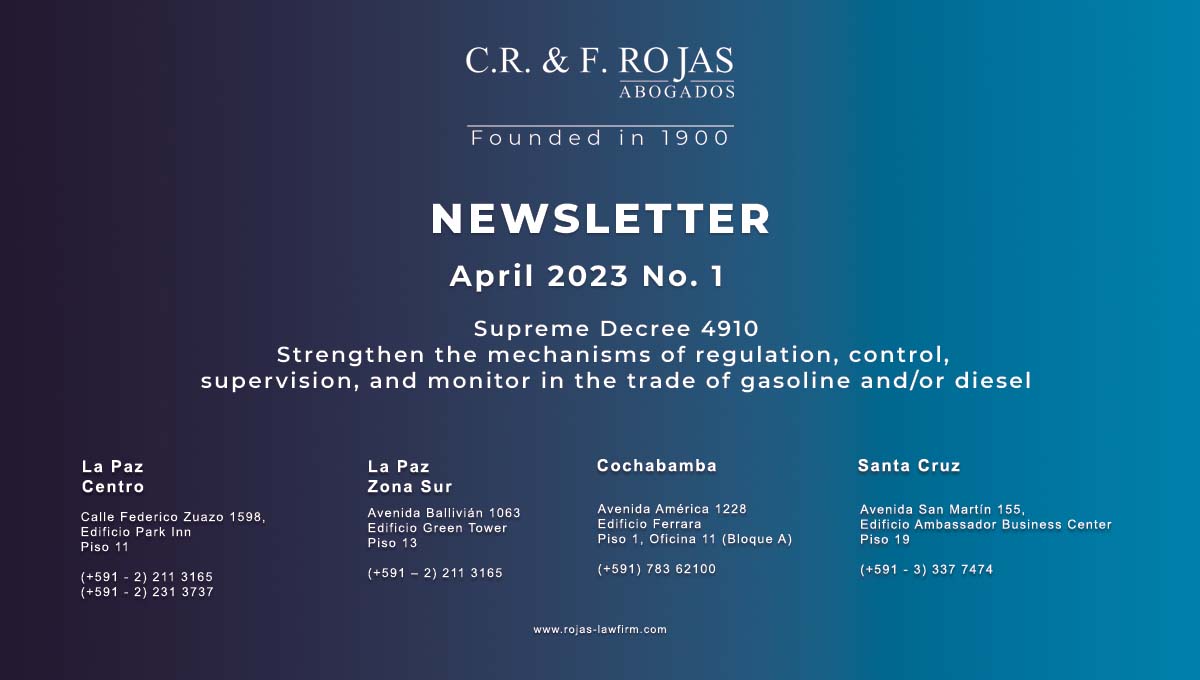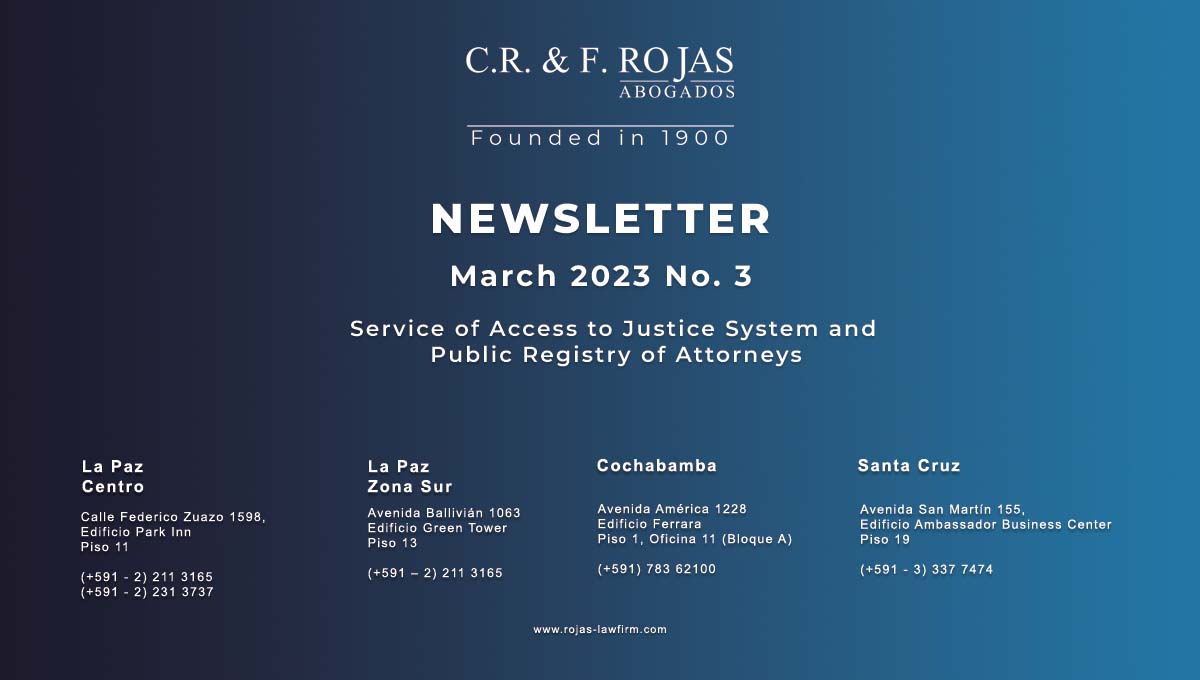According to Commercial Registry Law 1398, dated October 1, 2021, the supervision of the Commercial Registry will be passed on to the Ministry of Productive Development and Plural Economy.
The Second Transitory Provision provides that the Concessionaire of the Commercial Registry Service (“FUNDEMPRESA)”, will continue to provide the service seamlessly, pursuant to the same conditions and obligations provided in the concession contract, until the expiration of the transition from the Commercial Registry to State administration, within the period set out in the Supreme Regulatory Decree DS No. 4596 dated October 6, 2021.
PURPOSE
Supreme Decree 4596 addresses the creation of the Plurinational Commercial Registry Service – (“SEPREC”), as a public law decentralized public entity, with legal personality, and has autonomy, in administrative, financial, legal, technical management holding its own assets, subject to the supervision of the Ministry of Productive Development and Plural Economy.
It also provides the transition period for the Commercial Registry.
HEADQUARTERS
The main headquarters of SEPREC, are located in the city of La Paz. It can establish presence in the departmental capitals and other regional offices as appropriate, within the Bolivian territory.
COMPETENCE AND SCOPE
SEPREC can perform all the intrinsic acts of the Commercial Registry, and all its activities have full force and effect, within the Bolivian territory.
The legal effects of the acts and activities of SEPREC will have full force and effect outside the national territory, provided, that all the formalities, requirements and conditions provided by the international treaties and conventions ruling the matter, are duly complied.
POWERS OF THE PLURINATIONAL COMMERCIAL REGISTRY SERVICE
The SEPREC holds the following powers:
- Administer and exercise the functions of the Commercial Registry.
- Register, grant, and annually renew the Commercial Registration to natural and legal persons, both private and public, who are engaged in commercial activities within the framework of current regulations.
- Register the acts, contracts, and commercial documents, in accordance with the provisions of the Commercial Code and other rules in force.
- Prepare, formulate, and update the guides that describe of the services, the requirements to access the services and the general proceedings concerning the Commercial Registry.
- Approve the statutes, modifications, liquidation, dissolution, transformation, and merger of the joint-stock companies, in accordance with the provisions of the Commercial Code.
- Authorize the registration of companies by legally constituted shares.
- Certify the acts and documents registered with the Commercial Registry.
- Promote the activities of the Bolivian Commercial Registry, on the formalization of companies and business development, facilitating access to information and generating training programs.
- All those contained in the Commercial Code.
- Coordinate the implementation of a single registration and certification system for the integration of Economic Units, within the framework of a plural economy.
- Exchange information to allow the development of analyzes and studies related to industry and commerce, which support decision-making by the competent state bodies on the subject and by economic actors in general.
- Coordinate with the Ministries and public and private entities the application of Law 779, dated January 21, 2016, on De-bureaucratization for the Creation and Operation of Economic Units, generating de-bureaucratization strategies and promoting a unique code to identify the Economic Units.
- Establish mechanisms for the application of Law 947, dated May 11, 2017, on micro and small businesses, within the framework provided in subsection j) of this Paragraph.
- Provide training and technical assistance to promote business development.
- Design, develop and implement a geographic information system for registered and updated companies.
ORGANIZATIONAL AND FUNCTIONAL STRUCTURE
The SEPREC has the following structure:
- Executive Level.
- Operational Level.
MANAGEMENT
SEPREC is headed by an Executive Director General as the Highest Executive Authority, appointed by Supreme Resolution.
COMMERCIAL REGISTRATION
The granting of the commercial registration does not require any prerequisites in any registry. Therefore, SEPREC is the primary source of business information.
PROVISIONS
According to the Second Additional Provision, as of April 1, 2022, the name “FUNDEMPRESA” will be changed and adapted in all current regulations, to the “Plurinational Commercial Registry Service – SEPREC”.
The Concessionaire of the Commercial Registry Service (currently FUNDEMPRESA) will continue to provide the service seamlessly, in accordance with the terms and conditions contained in the concession contract, until March 31, 2022.
The SEPREC will begin its services on April 1, 2022.
THE SECOND TRANSITORY PROVISION PROVIDES THAT:
- The Concessionaire (FUNDEMPRESA) must provide the following to SEPREC:
- A physical file containing the originals of all documents and procedures registered at a national level without exception, the shelves in which they are filed, the delivery must be carried out gradually until the term set out under Paragraph I of the First Transitory Provision.
- The data of the companies, acts, procedures, documents, and other records consigned in the databases generated in the framework of the operations of the Commercial Registry, according to the requested structure and formats.
- The magnetic backup of all documents, certificates, publications, and procedures registered at the national level without exception, in the formats and mechanisms requested.
- The software required to manage the physical file and the necessary software to read the documents on magnetic backup, process and use, the Commercial Registry Database under the structure and digital format requested, including the source code and its technical rules.
- The Ministry of Productive Development and Plural Economy, through Ministerial Resolution, will regulate delivery activities, within a period of up to fifteen (15) business days after the publication of the Supreme Decree.
Sergio Dávila
C.R. & F. ROJAS ABOGADOS
This article does not constitute an analysis, it is a brief comment on the current legal norm in Bolivia.




